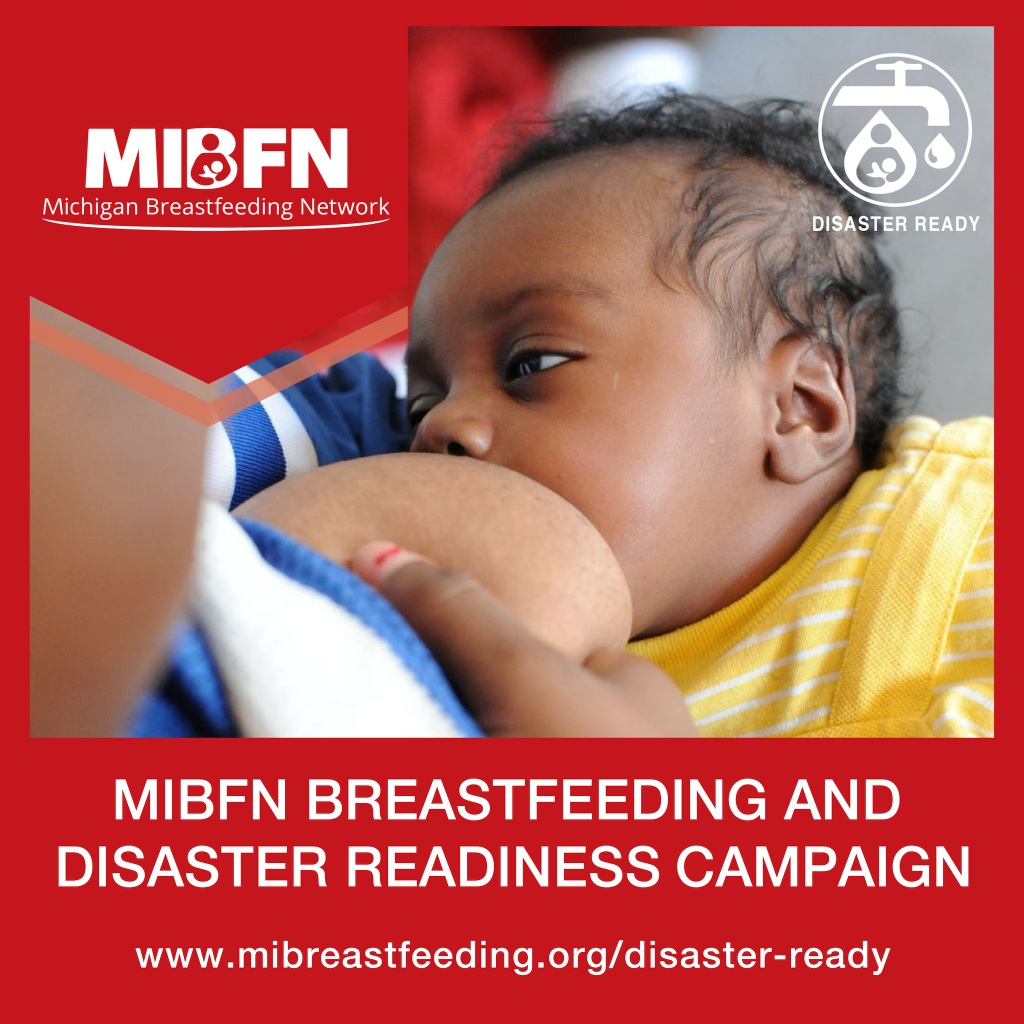 Michigan Breastfeeding Network (MIBFN) introduces its newest advocacy campaign in support of systems-level change. “Breastfeeding and Disaster Readiness” provides tools for equitable distribution of resources and access to breastfeeding support during times of crisis.
Michigan Breastfeeding Network (MIBFN) introduces its newest advocacy campaign in support of systems-level change. “Breastfeeding and Disaster Readiness” provides tools for equitable distribution of resources and access to breastfeeding support during times of crisis.
The newly released toolkit consists of eight elements, all available at www.mibreastfeeding.org/disaster-ready:
- Make Breastfeeding Part of Your Disaster Readiness Plan poster
- How to Hand Express Magnet and Poster
- FAQ Sheet: Breastfeeding is Disaster Readiness
- Breastfeeding and Lead Exposure Issue Statement and Recommendations
- Sample template for a policy supporting breastfeeding during an emergency
- A story-sharing platform for relief workers, volunteers, community organizers, medical care teams, and families
- The MIBFN System Changer’s Guide to Breastfeeding and Disaster Readiness for advocates and decision makers
- The MIBFN Position Paper in support of breastfeeding a vital component of disaster readiness for policy makers.
To reach a wider audience, some of the Disaster Readiness tools are available in Arabic, Burmese, English, Japanese, and Spanish.
In support of breastfeeding as a vital component of disaster readiness, MIBFN advocates for the following:
- Written breastfeeding policy should reflect best practice.
- All first responders should receive evidence-based breastfeeding training.
- Medical providers in areas with ongoing air/water pollution should understand blood contamination levels that would contraindicate breastfeeding.
- Vulnerable areas should undergo systemic breastfeeding changes to ensure best outcomes during times of disaster.
- Human milk should be widely available and equally accessible by all families during times of emergency.
- Infant formula should only be used as a last resort.
- The United States should comply with the WHO Code in order to protect breastfeeding.
Breastfeeding should be a part of every disaster readiness plan, no matter the scale of the disaster. Statements on infant feeding during disasters from the World Health Organization (WHO), United States Breastfeeding Committee (USBC), and United Nations International Children’s Emergency Fund (UNICEF) prioritize breastfeeding support and management and recommend breastfeeding always take precedence over the distribution of infant formula.
Human milk is one of the most valuable resources in communities around the state. How we advocate for all babies to receive human milk, especially during times of crisis, is key to optimal health for families. In times of crisis, equitable distribution of resources, such as lactation support and accessibility to human milk, is vital for public health based on breast milk’s ability to prevent hunger, stave off disease, combat malnutrition, and prevent young infant and child death. The “Breastfeeding and Disaster Readiness Toolkit” provides tangible solutions for evidence-based, culturally-sensitive breastfeeding support. MIBFN envisions a future in which breastfeeding is synonymous with disaster readiness, supported by both written and legislative policies for the protection of all families in Michigan. Join the movement here: www.mibreastfeeding.org/disaster-ready.
